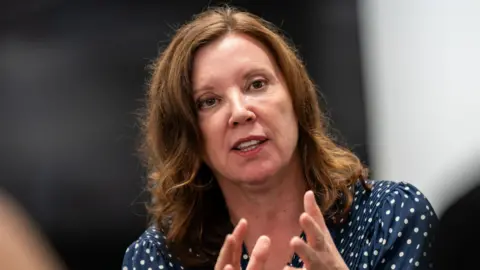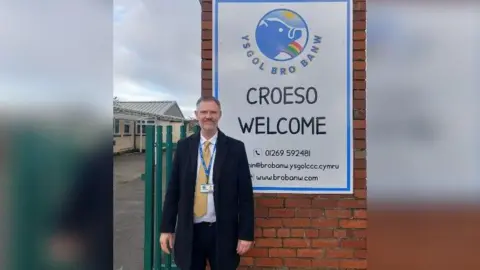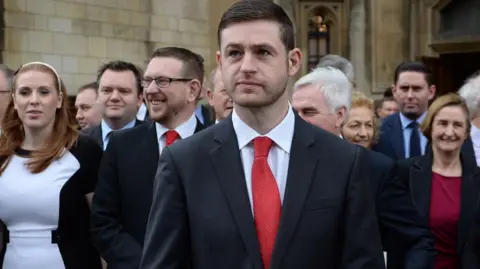Children face ‘lifetime cost’ of council crisis

 Getty Images
Getty Images
The wellbeing of children and young people is at risk from cuts to local services, the Children’s Commissioner has warned.
Analysis by the BBC shows local authorities are making £3bn in savings this financial year, but still face a funding shortfall of more than £5.7bn by 2026-27.
Local government experts said councils had carried out “all of the easy cuts” years ago and were now struggling to protect vital children’s and adult social care services.
Children’s Commissioner Dame Rachel de Souza said: “Children must not pay the price for balancing budgets.”
Local government minister Jim McMahon said the new government had inherited a crisis and there was “no shying away” from the scale of it.
The BBC’s Shared Data Unit surveyed 187 upper-tier authorities in the UK, which provide services from adult social care to bin collections and pothole repairs.
As well as having a growing black hole in their finances, councils were forced to dip into their reserves this year, drawing down more than £1bn in an effort to balance their books.
And 19 of them have called for financial support from the government – an “unprecedented” number, according to the Local Government Association (LGA).
Key findings
Our investigation found:
- Cuts to social workers and safeguarding teams, along with reductions in spend on teams helping young people at risk of sexual exploitation
- A significant number of reviews and cuts concerning transport for disabled children and adults
- Reduction in spend on legal services, including on counsel for children’s social care cases
- Cuts to numerous projects supporting young people, reductions in playground maintenance and pauses in apprenticeship recruitment
- Widespread cuts to education spend, affecting teaching staff and classroom budgets as well as music lessons
- Removal of period poverty programmes

 PA
PA
Dame Rachel said many of the savings proposals would “disproportionately impact children who rely on the state for protection and a stable home environment”.
Echoing her comments, the chief executive of the children’s charity Barnardo’s, Lynn Perry, said threatened services – like family centres and youth projects – played a vital role in ensuring challenges were addressed before they could escalate.
She said: “Whilst scaling back children’s services might seem like a way to balance budgets, it ultimately has a lifetime cost for a generation of children.”

 Peter Evans
Peter Evans
Peter Evans, from Carmarthenshire, has been a headteacher for 22 years and said the situation facing schools was “the worst it has ever been”.
He said cuts and changes to non-statutory early intervention services were having a significant impact, with his school having to spend more on nappies, wipes and changing tables.
“We are in a perfect storm with our money going down and need going up, with more children coming in non-verbal and not toilet trained and access to services like speech and language, educational psychologists and occupational therapy under threat,” Mr Evans said.
“Councils are in a difficult position, but children get one chance and children are the future.”
Paul Whiteman, general secretary of school leaders’ union NAHT, said the BBC’s findings “lay bare the tough reality many schools and families are facing” as a result of council-funded education budgets being slashed.
He warned the situation could eventually undermine the education system’s ability to support children.
‘Limiting lives’
Campaigners say the budgetary crisis in local government is also limiting the lives of millions of disabled people.
Mikey Erhardt, from Disability Rights UK, said many were being plunged into “hardship, isolation, distress and deepening poverty” as a result.
He said the situation was also affecting the life chances of disabled children, who faced a constant battle for support.
“The underfunding of social care in particular goes far beyond the numbers on a Whitehall spreadsheet – it goes to the very core of how we value the lives of disabled citizens,” he said.
“Millions of us, young and old, are going without the care and support we need.”
He added when care and support was provided, it was often just the basics rather than the support needed to life a full life and engage with others.

 Vickki Byrne
Vickki Byrne
Former teaching assistant Vickki Byrne has seen the impact of classroom budget cuts and reduced council services as both a professional and a parent.
“I’ve seen children with Education and Health Care Plans, who are supposed to receive one-on-one support, have their teaching assistant dragged away to help with the rest of the class,” she said.
“These children want to work and do well but they are in an environment that isn’t supporting them.”
Ms Byrne said she had seen pupils in their final years of secondary school who could “barely read and write” and had had to “fight tooth and nail” to get support for her own child.
She said her daughter, who struggled to cope in her mainstream school, had suffered as a result of significant delays to support from social workers and other local authority services.
“There’s no safety net now and it’s an absolute nightmare,” she said. “I’ve had to give up my job and become a full-time carer for my daughter and I’ve even had to call crisis services for myself because I became suicidal after not being able to get the help for her.”
‘Scrabbling around’
The BBC’s analysis also uncovered examples of councils approving the removal of flagpoles, cutting long service awards for staff, removing coastal lifeguards, ending asbestos collection from households and introducing dynamic theatre pricing so tickets cost more as demand rises.
Dr Jonathan Carr-West, chief executive of the Local Government Information Unit (LGiU), said it proved local authorities were “scrabbling about” and putting forward “almost comical” proposals in a desperate attempt to safeguard vital services.
LGA chairwoman Louise Gittins warned the risk of financial failure across local government was “becoming systemic”.
She joined the LGiU in calling on the new Labour government to provide councils with financial stability and funding reform, including the introduction of multi-year funding settlements.

 PA
PA
Councils are funded through a mix of council tax, business rates, income from services like parking and social housing rent, as well as money from the government known as the Revenue Support Grant.
That funding declined by nearly a third between 2010 and 2021, according to the Public Accounts Committee, which found council income was £8.4bn lower in real terms than the decade before.
McMahon said these “deep-rooted” problems could not be fixed overnight, adding the government was committed to “reforming and rebuilding” the sector.
The minister said: “We will work hand-in-hand with councils by moving towards multi-year funding settlements to provide long-term stability, ending competitive bidding processes, and ensure the sector gets back on its feet.”
More stories from the BBC








